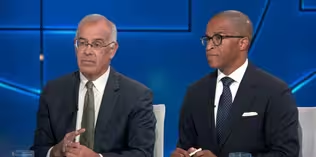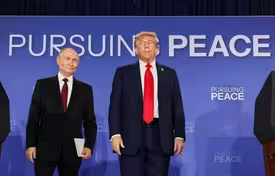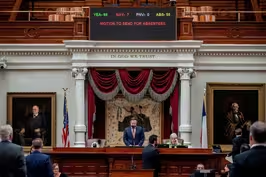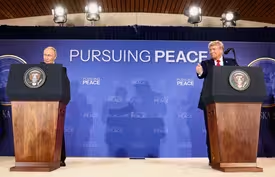
Rural newspapers close in latest blow to local journalism
Clip: 8/15/2025 | 6m 47sVideo has Closed Captions
Dozens of rural newspapers shut down in latest disappearance of local journalism
Facing deep financial troubles, News Media Corporation shut down 23 news operations in five states. The closures are just the latest in a trend contributing to news deserts in rural America. Stephanie Sy discussed what this means for the future of local news with Teri Finneman, a journalism professor at the University of Kansas and co-author of "Reviving Rural News."
Problems playing video? | Closed Captioning Feedback
Problems playing video? | Closed Captioning Feedback
Major corporate funding for the PBS News Hour is provided by BDO, BNSF, Consumer Cellular, American Cruise Lines, and Raymond James. Funding for the PBS NewsHour Weekend is provided by...

Rural newspapers close in latest blow to local journalism
Clip: 8/15/2025 | 6m 47sVideo has Closed Captions
Facing deep financial troubles, News Media Corporation shut down 23 news operations in five states. The closures are just the latest in a trend contributing to news deserts in rural America. Stephanie Sy discussed what this means for the future of local news with Teri Finneman, a journalism professor at the University of Kansas and co-author of "Reviving Rural News."
Problems playing video? | Closed Captioning Feedback
How to Watch PBS News Hour
PBS News Hour is available to stream on pbs.org and the free PBS App, available on iPhone, Apple TV, Android TV, Android smartphones, Amazon Fire TV, Amazon Fire Tablet, Roku, Samsung Smart TV, and Vizio.
Providing Support for PBS.org
Learn Moreabout PBS online sponsorshipGEOFF BENNETT: Dozens of communities across five Midwestern states are now left without a local new source, and the journalists who served them are suddenly out of work following the abrupt shutdown of a regional newspaper chain.
Stephanie Sy has more.
STEPHANIE SY: Facing deep financial troubles, News Media Corp has decided to shut down 23 news operations, six in Wyoming, seven in Illinois, five in Arizona, four in South Dakota, and one in Nebraska.
The closures by the Illinois-based company are just the latest in a trend contributing to growing news deserts in rural America.
Over the past two decades, more than a third of the nation's newspapers have disappeared.
For more on what this means for the future of local news, I'm joined by Teri Finneman, journalism professor at the University of Kansas and co-author of "Reviving Rural News: Transforming the Business Model of Community Journalism in the U.S. and Beyond."
Teri, thank you so much for joining the "News Hour."
I understand that you previously partnered with one of these newspapers in South Dakota, The Brookings Register.
The Brookings mayor said that paper is irreplaceable, a town of 25,000 people who needed this local newspaper.
Can you talk about the role of a paper like this in a small town like Brookings?
TERI FINNEMAN, Journalism Professor, University of Kansas: Yes, I mean, it's absolutely critical.
There's a reason that, when this part of the United States was settled, a newspaper was one of the first businesses that was established.
It made you a real town to have a newspaper.
It is a central place in the community, especially in a time when the nation is so divisive.
A newspaper is really that central place to get information about your community that nobody else is covering, to learn what's going around -- on around you, to be covering your government for you, to be covering when your school wins the homecoming game.
Those things are really important to community identity.
And so, when you lose your newspaper, especially out of the blue, with absolutely no warning, it was just absolutely shocking to this community and the others for that to happen.
STEPHANIE SY: Yes, I was reading that one of the newspapers, in Page, Arizona, had been open for 150 years.
And a lot of these papers are what's called the newspapers of record, meaning they not only cover local news.
They are where public notices are published to meet legal requirements.
What happens when those no longer exist?
TERI FINNEMAN: Well, I mean, you're right.
Losing the community's history that has been preserved in those newspapers for years is an enormous loss of identity, of being able to go back and learn about your town and what it's went through, the obituaries, which remain one of the most popular aspects of the newspaper for keeping a community's history.
I mean, this is an enormous loss to figure out what to do.
What about the Web sites of these and all of the online material that was there?
What is going to happen to that?
And so this isn't just about losing the day-to-day of the news coverage, but really the whole history of the town.
STEPHANIE SY: News Media Corp, not to be confused, by the way, with the massive conglomerate News Corp, News Media Corp was blamed by some employees for being poorly managed.
But, as you know, hundreds of local newspapers are going under every year.
What are the common challenges of keeping these newspapers going?
TERI FINNEMAN: Yes, it's a really complex issue, which is why it hasn't been solved yet.
So there's numerous things to think about.
Number one is that the business model that newspapers continue to rely on today was formed in the 1800s.
Literally, Andrew Jackson was president when this concept of a penny press was created.
And that was literally that news was one penny.
In other words, news should be very cheap.
And so, when you look, nearly 200 years later, many newspapers are still only $1 an issue.
We need to be charging more for local news.
Now, of course, that's challenging, when we are in this environment where people think that news should be free.
Advertising, we know, has declined rapidly since the Internet and especially since the pandemic.
So that is a huge gap.
I mean, that has sustained newspapers forever, is that advertising revenue.
You also have the competition from social media and all of the misinformation on social media.
You have all of these other different venues now for getting news.
But, really, when you look at it, you only have that one local newspaper that is truly covering your community and where you can get local information.
And so trying to explain this more to people in the community how important it is to subscribe to your paper, to advertise in your paper, to provide that for your town, I mean, what happened with these two dozen newspapers should really be a wakeup call for others across the nation how critical it is to support local news, so this doesn't happen in your community.
STEPHANIE SY: In Wyoming, two publishers have actually agreed to purchase the newspapers that News Media Corp was going to shut down in that state.
What do you make of that deal, Teri?
Is that the best that local newspapers can hope for in the short term, that there's an in-state buyer or a benefactor to save them?
TERI FINNEMAN: Yes, and, I mean, that is increasingly common, because we're seeing a number of publishers who are in their -- outside of this who are in their 70s and 80s who are trying to sell their newspapers and can't find anybody to take them over.
And so you will see these neighboring newspapers step in to try to help these towns and save their communities.
One of the things that we really need to work on is introducing young new reporters to the opportunities in rural news.
So much of the emphasis is on national media, when most of the journalism that happens in this country is taking place in rural areas, and we need to do a better job of supporting local news in order to save it, because I am quite worried in the coming years how many aging publishers there are and how many other newspapers may end up going under if there's nobody else to take over these papers.
STEPHANIE SY: That is Teri Finneman, author and journalism professor at the University of Kansas, joining us.
Teri, thank you.
TERI FINNEMAN: Thank you.
Brooks and Capehart on Trump's summit with Putin
Video has Closed Captions
Clip: 8/15/2025 | 10m 21s | Brooks and Capehart on Trump's summit with Putin (10m 21s)
Ex-State Department official analyzes Trump-Putin summit
Video has Closed Captions
Clip: 8/15/2025 | 6m 6s | 'Putin stuck to his guns': Former State Department official analyzes Trump-Putin summit (6m 6s)
News Wrap: Abbott calls 2nd special session in Texas
Video has Closed Captions
Clip: 8/15/2025 | 5m 33s | News Wrap: Abbott calls 2nd second special session for new congressional maps in Texas (5m 33s)
Trump, Putin meet with future of Ukraine hanging in balance
Video has Closed Captions
Clip: 8/15/2025 | 4m 54s | Trump meets Putin in Alaska with future of Ukraine war hanging in balance (4m 54s)
What Trump and Putin said – and didn't say – after meeting
Video has Closed Captions
Clip: 8/15/2025 | 3m 15s | What Trump and Putin said – and didn't say – after their meeting in Alaska (3m 15s)
Providing Support for PBS.org
Learn Moreabout PBS online sponsorshipSupport for PBS provided by:
Major corporate funding for the PBS News Hour is provided by BDO, BNSF, Consumer Cellular, American Cruise Lines, and Raymond James. Funding for the PBS NewsHour Weekend is provided by...
















